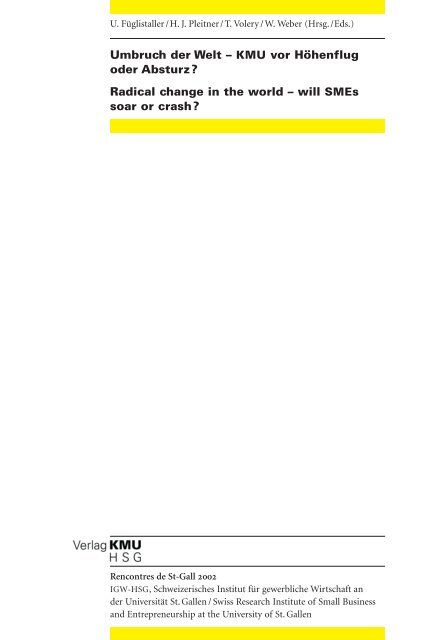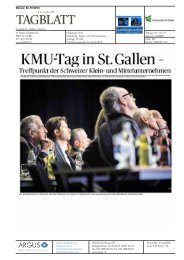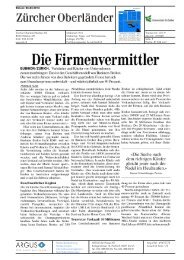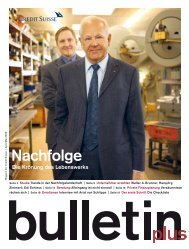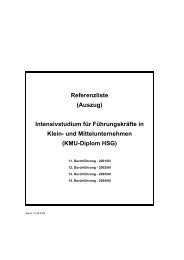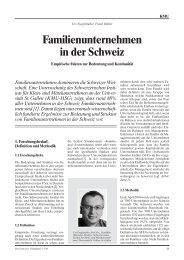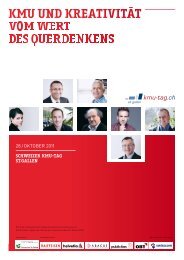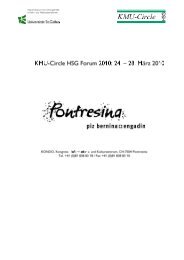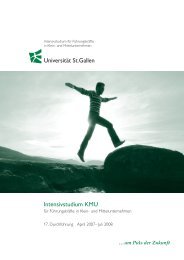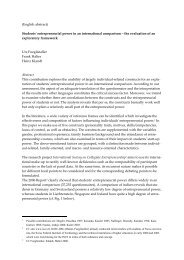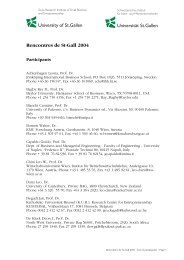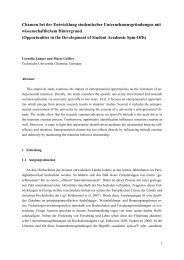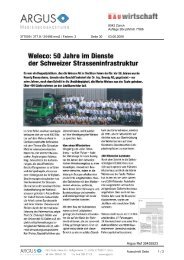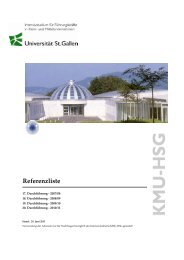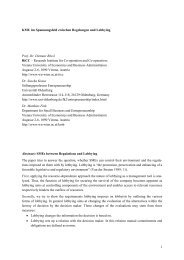download PDF - beim KMU-HSG - Universität St.Gallen
download PDF - beim KMU-HSG - Universität St.Gallen
download PDF - beim KMU-HSG - Universität St.Gallen
Erfolgreiche ePaper selbst erstellen
Machen Sie aus Ihren PDF Publikationen ein blätterbares Flipbook mit unserer einzigartigen Google optimierten e-Paper Software.
U. Füglistaller /H. J. Pleitner / T. Volery / W. Weber (Hrsg. /Eds.)<br />
Umbruch der Welt – <strong>KMU</strong> vor Höhenflug<br />
oder Absturz<br />
Radical change in the world – will SMEs<br />
soar or crash<br />
Rencontres de <strong>St</strong>-Gall 2002<br />
IGW-<strong>HSG</strong>, Schweizerisches Institut für gewerbliche Wirtschaft an<br />
der Universität <strong>St</strong>. <strong>Gallen</strong> / Swiss Research Institute of Small Business<br />
and Entrepreneurship at the University of <strong>St</strong>. <strong>Gallen</strong>
Beiträge zu den Rencontres de <strong>St</strong>-Gall 2002<br />
Papers presented to the Rencontres de <strong>St</strong>-Gall 2002<br />
Wir danken den folgenden Institutionen für ihre freundliche<br />
Unterstützung /<br />
We would like to thank the following institutions for their kind<br />
support:<br />
Antalis AG<br />
Bühler-Reindl-Fonds der Universität <strong>St</strong>.<strong>Gallen</strong><br />
Fonds zur Aus- und Weiterbildung von Fachkräften aus<br />
Osteuropa des Kantons <strong>St</strong>. <strong>Gallen</strong><br />
Gesellschaft zur Förderung des Schweizerischen Instituts<br />
für gewerbliche Wirtschaft<br />
Swiss International Air Lines<br />
Zürich Schweiz, Business-Partner
U. Fülistaller / H. J. Pleitner / T. Volery / W. Weber (Hrsg. /Eds.)<br />
Umbruch der Welt – <strong>KMU</strong> vor Höhenflug<br />
oder Absturz<br />
Radical change in the world – will SMEs soar<br />
or crash
(c) 2002<br />
bei den Verfassern und <strong>beim</strong> Schweizerischen Institut für<br />
gewerbliche Wirtschaft an der Universität <strong>St</strong>. <strong>Gallen</strong> (IGW)<br />
(c) 2002<br />
Authors and Swiss Research Institute of Small Business and<br />
Entrepreneurship at the University of <strong>St</strong>. <strong>Gallen</strong> (IGW)<br />
<strong>KMU</strong> Verlag <strong>HSG</strong><br />
Kirchlistrasse 44<br />
CH–9010 <strong>St</strong>. <strong>Gallen</strong><br />
http://www.igw.unisg.ch<br />
Druck/printed by: Niedermann Druck AG (<strong>St</strong>. <strong>Gallen</strong>)<br />
Redaktion und typographische Ausführung /<br />
Editorial work and typeset by:<br />
Fabienne Locher & Walter Weber<br />
ISBN 3-906541-18-5
Die Rencontres de <strong>St</strong>-Gall widmen diesen Band Margrit Habersaat als<br />
Anerkennung für ihren unermüdlichen Einsatz zugunsten<br />
Unternehmertum und <strong>KMU</strong> über fünfzig Jahre.<br />
The Rencontres de <strong>St</strong>-Gall dedicate this volume to Margrit Habersaat,<br />
acknowledging her unsparing commitment to entrepreneurship and<br />
SMEs for the past fifty years.
Inhalt / Contents<br />
Vorwort 13<br />
Preface 15<br />
Thema A: <strong>KMU</strong> unter fragilen Bedingungen<br />
Topic A: SMEs under fragile conditions<br />
Klaus Ballarini<br />
Nachfolgeprobleme in mittelständischen Unternehmen 19<br />
Mojca Duh<br />
The role of small and medium-sized family enterprises in the economic<br />
development of Slovenia 31<br />
John R. G. Jenkins<br />
Small and medium-sized businesses in Argentina:<br />
Coping with economic crises 41<br />
Asko Miettinen<br />
Estonian SMEs in a fragile environment 1991 – 2000 49<br />
J. Hanns Pichler<br />
Nachfolgepotenziale in <strong>KMU</strong> – Empirische Befunde mit branchenspezifischen<br />
Charakteristika für Österreich 61<br />
Kiril Todorov<br />
The new challenges for transition countries: Female entrepreneurs in regions<br />
with industrial decline 75<br />
Alexander Tschepurenko<br />
Das Unternehmerpotential der russischen Gesellschaft: Anhand einer<br />
gesamtrussischen Umfrage der Bevölkerung 85<br />
Friederike Welter<br />
Kontrolle ist gut – Vertrauen ist besser Bedingungen unternehmerischen<br />
Handelns in Transformationsländern 101<br />
7
Thema B: Öffentliche Ansprüche und <strong>KMU</strong><br />
Topic B: Public demands and SMEs<br />
André Nijsen<br />
New relationships between public and private spheres – Socially responsible<br />
undertaking 113<br />
Karl-Heinz Schmidt<br />
Sog und Druck zur internationalen Kooperation in der Lehre und Forschung<br />
über <strong>KMU</strong> 125<br />
Wee-Liang Tan and Teck-Meng Tan<br />
Social entrepreneurship in Singapore 133<br />
Shigeki Tonooka<br />
Revision of policies supporting SMEs in Japan 143<br />
José Mª Veciana, Marinés Aponte and David Urbano<br />
Institutions and support programmes for entrepreneurship: A two countries<br />
comparison 147<br />
Thema C: Antworten der <strong>KMU</strong> auf neue Fragen<br />
Topic C: SMEs’ responses to new questions<br />
Carmine Bianchi and Enzo Bivona<br />
Opportunities and pitfalls related to internet-based strategies in small and<br />
medium-sized firms – A system dynamics approach 163<br />
Dirk Deschoolmeester, Olivier Braet and Annick Lootens<br />
Internet-ability – The feasibility and ability of information technology adoption<br />
by SMEs 181<br />
Marc Gruber<br />
Transformation as a challenge: New ventures on their way to viable entities 193<br />
Norbert Kailer<br />
Wie lernen GründerInnen und JungunternehmerInnen (und was lernen ihre<br />
Helfer daraus) Förderung des Gründungs- und Übernahmeerfolges durch Abbau<br />
der „gaps“ zwischen Bedarfslage der Nachfrager und Angebotsgestaltung durch<br />
unterstützende <strong>St</strong>ellen 203<br />
8
Jörn-Axel Meyer<br />
„New Economy“ – Anmerkungen zu Sinn und Unsinn eines<br />
Forschungssubjektes 215<br />
Herbert Neubauer<br />
Unterstützungsdienste und Unterstützungsleistungen im Rahmen des Gründungsprozesses<br />
– empirische Auseinandersetzungen mit ihren Determinanten 223<br />
Ovidiu Nicolescu<br />
Knowledge based economy: Factors which determine SMEs’ placement as the first<br />
priority of the economic growth in the 21st century 235<br />
Simon Tam<br />
The nature of entrepreneur-environment relations –<br />
A participant reconstruction perspective 243<br />
Ágnes Tibor<br />
Art enterprises in Hungary today regarding changes both in economy and arts<br />
(moving from the centralised system to the market economy) – status report<br />
and problem analysis 259<br />
Thema D: <strong>KMU</strong> unter lokalen, regionalen und globalen Einflüssen<br />
Topic D: SMEs under local, regional and global influences<br />
Michael J. Christie<br />
Entrepreneurial firms and globalisation: A theoretical perspective of faster speed<br />
to market for global traders 267<br />
Jian Gao<br />
<strong>St</strong>ructural change, environment and policies of entrepreneurial firms in China 276<br />
Klaas Havenga<br />
Human capital and other important factors as elements of entrepreneurship<br />
and SMEs in developing economies 285<br />
Per-Anders Havnes<br />
The dynamics of the internationalisation process – Interpretation of empirical<br />
evidence 295<br />
Pertti Kettunen<br />
<strong>St</strong>rengthening the competitive edge of SMEs through new regional and local<br />
measures 311<br />
9
Michel Marchesnay<br />
Individual and collective entrepreneurship for SMEs: The case of<br />
“French Exception” 319<br />
Mario Raffa, Gianluca Esposito, Luca Iandoli and Giuseppe Bruno<br />
Hi-tech small firms in developing countries: An exploratory<br />
analysis 333<br />
Thema E: Kompetenzniveau und Kompetenzmessung<br />
Topic E: Competence levels and competence measurement in SMEs<br />
Guido Capaldo, Luca Iandoli, Mario Raffa and G. Zollo<br />
Eliciting small firms’ competencies: Methodological issues 349<br />
Leo W. Chini<br />
Auswirkungen der 1. Säule von Basel II auf die Finanzierungsstrukturen<br />
und Fremdkapitalkosten der <strong>KMU</strong> 363<br />
Urs Füglistaller und Frank Halter<br />
Geschäftsmodelle und Kompetenzen im Wandel der Zeit – eine Diskussion<br />
aus der Sicht des strategischen Managements 373<br />
Brian Gibson<br />
An exploratory analysis of patterns of movement in the financial structure of<br />
Australian small firms 385<br />
Egbert Kahle und Ricarda B. Bouncken<br />
Entwicklung von Netzwerken – von der Vorgründung bis zum frühen<br />
Wachstum 397<br />
Christoph A. Müller<br />
Balanced Scorecard für <strong>KMU</strong> mit Berücksichtigung des Beziehungsmanagements<br />
411<br />
Walter Sertl<br />
Basel II – was der neue Basler Eigenkapitalakkord für die <strong>KMU</strong> bringen wird,<br />
wie sie sich auf ihn einstellen sollten und welche Unterstützung sie von aussen<br />
erhalten könnten 419<br />
Cornelia Zanger<br />
Kompetenzen in <strong>KMU</strong>-Netzwerken 427<br />
10
Thema F: Veränderte Werte und ihr Einfluss auf <strong>KMU</strong><br />
Topic F: Changing values and their impact on SMEs<br />
D. Ray Bagby, E. Umble and L. E. Palich<br />
Do corrupt practices affect the development of SMEs An exploratory study 443<br />
Janko Belak und Štefan Kajzer<br />
Komparative Analyse wissenschaftlicher Untersuchungen von<br />
Familienunternehmen in den mitteleuropäischen Ländern 451<br />
Jan Degadt<br />
Family and business: Complementary and conflicting values 459<br />
G. J. de Klerk and S. Kruger<br />
The driving force behind entrepreneurship: An exploratory<br />
perspective 469<br />
Antti Haahti<br />
A note on identity economy 477<br />
Raymond W. Y. Kao, Kenneth R. Kao and Rowland R. Kao<br />
About: Entrepreneurism: A philosophy and sensible alternative for the market<br />
economy 487<br />
Jean-Jacques Obrecht<br />
Plädoyer für eine alternative Auffassung des Unternehmers des<br />
21. Jahrhundert 497<br />
Hans Jobst Pleitner und Martina L. Jakl<br />
Wertewandel bei Unternehmern – Schlagwort oder Realität 513<br />
Michael Schaper<br />
The challenge of environmental responsibility and sustainable development:<br />
Implications for SME and entrepreneurship academics 525<br />
Mitsuru Tanaka<br />
Industrial economy and human rights problems – present conditions of small<br />
and medium sized entreprises of Buraku and tasks through investigations into<br />
the actual conditions 535<br />
Thierry Volery<br />
Ecopreneurship: Rationale, current issues and futures challenges 541<br />
11
David Watkins, Ajay Bhalla and <strong>St</strong>even Henderson<br />
A test of the appropriateness of alternative strategic management paradigms in the<br />
context of high growth ethnic and non-ethnic family firms 555<br />
Autoren- und Teilnehmerverzeichnis /<br />
List of authors and participants 573<br />
12
Vorwort<br />
Seit dem ersten Zusammentreffen im Jahr 1948 stehen die kleinen und mittleren Unternehmen<br />
(<strong>KMU</strong>) im Mittelpunkt der Rencontres de <strong>St</strong>-Gall. Die Entwicklung der<br />
Rencontres über mehr als ein halbes Jahrhundert wird Thema einer umfangreichen<br />
dogmenhistorischen Analyse von Karl-Heinz Schmidt. Erste Resultate sind in seinem<br />
Beitrag in diesem Band zu finden, die detaillierten Ergebnisse werden in einer eigenen<br />
Publikation erscheinen.<br />
Obwohl kurz nach dem Zweiten Weltkrieg kaum jemand den <strong>KMU</strong> eine Zukunft<br />
geben wollte, glaubten die Gründerväter der Rencontres de <strong>St</strong>-Gall schon damals an<br />
Rolle und Aufgabe der <strong>KMU</strong>. Die Rencontres repräsentieren denn auch die weltweit<br />
älteste <strong>KMU</strong>-Forscherkonferenz ihrer Art. Um den Geist der Rencontres de <strong>St</strong>-Gall zu<br />
verstehen, muss man die Umstände kennen, die die erste Konferenz begleiteten. Angesichts<br />
der Nachwirkungen des Zweiten Weltkrieges bot sie eine einzigartige Plattform,<br />
auf der Forscher aus kriegsverwüsteten und intakten Ländern einen Dialog wiederaufnehmen<br />
konnten. Ziel der Konferenz war es darüber hinaus, Theorien zu entwickeln<br />
und Erfahrungen („best practices“) auszutauschen, die den <strong>KMU</strong> helfen und gleichzeitig<br />
wirtschaftliches Wachstum und Entwicklung fördern.<br />
Mehr als fünfzig Jahre später bleiben jene beiden Anliegen – die Förderung des Dialogs<br />
und die Erweiterung der wissenschaftlichen Grenzen – im Zentrum der Rencontres<br />
de <strong>St</strong>-Gall. Inzwischen ist klar geworden, dass Kommunikation und Wissen Schlüsselpositionen<br />
für <strong>St</strong>abilität, Frieden und wirtschaftliches Wohlergehen sind. Dementsprechend<br />
sind <strong>KMU</strong> und Entrepreneurship (Unternehmertum) immerwährend aktuelle<br />
Themen. Entrepreneurship gilt als Triebwerk wirtschaftlichen Wachstums, und<br />
<strong>KMU</strong> – als Ergebnis unternehmerischen Antriebs – bilden das Rückgrat unserer Volkswirtschaften.<br />
In einem turbulenten Umfeld jedoch müssen <strong>KMU</strong>-Theorien und -Modelle<br />
schneller aktualisiert werden, und neues Wissen ist zunehmend rascher zu erarbeiten<br />
und aufzunehmen.<br />
Ein besonderes Merkmal der Rencontres de <strong>St</strong>. Gall bleibt ihr spezielles Procedere:<br />
Die von den Organisatoren eingeladenen fünfzig Teilnehmer erhalten die Tagungsbeiträge<br />
vor der Konferenz und haben damit genügend Zeit, die Beiträge ihrer Kollegen zu<br />
studieren. Die Konferenz selber findet dann in Form von Plenarsitzungen statt, an<br />
denen die zum jeweiligen Thema eingereichten Beiträge anfangs vom Moderator zusammengefasst<br />
und vor allem diskutierend erörtert werden. Dieses Procedere erlaubt es<br />
allen Teilnehmern, nach ihren Vorstellungen aktiv in die Diskussion einzugreifen und<br />
in einer stimulierenden und konstruktiven Art und Weise zum Austausch von Meinungen<br />
und Ideen beizutragen. Ausserdem verpasst niemand einen interessanten Disput,<br />
wie es bei parallel laufenden Tagungsblöcken immer geschieht.<br />
Das Oberthema der diesjährigen Rencontres heisst „Umbruch der Welt – <strong>KMU</strong> vor<br />
Höhenflug oder Absturz “. Es reflektiert, bis zu einem gewissen Grad, die derzeit relativ<br />
schwierige Situation der <strong>KMU</strong>. Die „dotcom“-Blase ist geplatzt und hat Milliardenverluste<br />
verursacht. Zwei gewichtige Wirtschaftsmächte, die USA und Japan, mühen sich<br />
13
mit einer beharrlichen Rezession ab, während die europäischen Märkte zu stagnieren<br />
scheinen. Gleichzeitig sind die Börsen der industrialierten Länder in der Schieflage<br />
geraten und die Notierungen auf einen seit Jahren nicht erlebten Tiefstand abgesunken.<br />
Sechs Hauptthemen werden während der diesjährigen Konferenz behandelt. Thema<br />
1, „<strong>KMU</strong> unter fragilen Bedingungen“, umfasst verschiedene Beiträge, die sich mit<br />
unsicheren Umfeldern und den sich darin bewegenden <strong>KMU</strong> widmen. Thema 2, „Öffentliche<br />
Ansprüche und <strong>KMU</strong>“, beschäftigt sich mit dem Verhältnis von öffentlichen<br />
Körperschaften und <strong>KMU</strong>. Thema 3, „Antworten der <strong>KMU</strong> auf neue Fragen“, deckt<br />
jüngst aufgetauchte Themenfelder ab, etwa im Bereich der Technologien, Unternehmenstypen<br />
und Beschäftigungsarten. Thema 4, „<strong>KMU</strong> unter lokalen, regionalen und<br />
globalen Einflüssen“, beleuchtet die räumliche Dimension des Managements: Regionale<br />
Cluster, regionale Wettbewerbsvorteile und die lokale bzw. internationale Orientierung<br />
der <strong>KMU</strong>. Thema 5, „Kompetenzniveau und Kompetenzmessung“, diskutiert<br />
einerseits die unterschiedlichen Kompetenzvarianten der Unternehmer in <strong>KMU</strong> und<br />
deren Messung, andererseits die Rolle des Informations- und Wissensmanagements.<br />
Thema 6, „Veränderte Werte und ihr Einfluss auf <strong>KMU</strong>“, behandelt Themen im Umkreis<br />
von Denk- und Wertmustern, Ethik, gesellschaftlicher Verantwortung und Umweltschutz.<br />
Wir hoffen, dass unsere Kolleginnen und Kollegen der Rencontres de <strong>St</strong>-Gall die<br />
vorliegende Schrift inspiriert und die Texte der <strong>KMU</strong>-Gemeinschaft dienen werden.<br />
Urs Füglistaller, Hans Jobst Pleitner, Thierry Volery und Walter Weber<br />
<strong>St</strong>. <strong>Gallen</strong> / Hergiswil, September 2002<br />
14
Preface<br />
The field of small and medium-sized enterprises (SMEs) has been at the heart of the<br />
Rencontres de <strong>St</strong>-Gall since its inception in 1948. Karl-Heinz Schmidt is preparing a<br />
comprehensive historical dogma analysis reflecting the development of the Rencontres<br />
de <strong>St</strong>-Gall from 1948 to 2002. First hints are presented in this book, the detailed result<br />
will appear in a separate publication.<br />
While hardly anybody saw the future for the SMEs shortly after World War II the<br />
founding fathers of the Rencontres de <strong>St</strong>-Gall believed in their role and mission. As a<br />
consequence, the Rencontres now represent the oldest SMEs conference in the world.<br />
To understand the “spirit of the Rencontres de <strong>St</strong>-Gall”, it is important to consider the<br />
context in which the conference first convened. In the aftermath of World War II, it<br />
served as a unique forum to bring together researchers from devastated and intact<br />
countries and to re-establish a dialogue. The conference also aimed at developing theories<br />
and exchanging best practice examples, which could help SMEs, and in turn foster<br />
economic growth and development.<br />
More than fifty years later, those two goals – furthering dialogue and pushing the<br />
boundaries of science – remain at the core of the Rencontres de <strong>St</strong>-Gall. Since we are<br />
aware that communication and knowledge are keys for stability, peace, and economic<br />
prosperity. Correspondingly, SMEs and entrepreneurship are an ever relevant topical<br />
field. Entrepreneurship is widely considered to be the engine of economic growth, and<br />
SMEs – one of the outcomes of entrepreneurial activities – form the backbone of our<br />
economies. Since we live in a very turbulent environment, theories and models for<br />
SMEs need to be updated more frequently and new knowledge must be produced at an<br />
even increased pace.<br />
Another feature of the Rencontres de <strong>St</strong>-Gall resides in its unique format: Fifty persons,<br />
taking part on an invitation basis, receive the papers before the conference providing<br />
ample time to read the contributions. During the conference, there are only<br />
plenary sessions. The papers tackling a similar topic are briefly summarised by the chair<br />
person during a session covering this particular topic. Afterwards, there is a general<br />
discussion amongst the participants. This format allows all participants to take part in<br />
the discussion, if they wish, and to exchange opinions and ideas in a stimulating and<br />
constructive way. Moreover, nobody needs to miss an interesting dispute as this can<br />
happen with reunions including parallel sessions.<br />
This year, the general theme of the Rencontres is “Radical change in the world – will<br />
SMEs soar or crash ” This theme reflects, to a certain extent, the difficult situation of<br />
SMEs today. The “dotcom bubble” has burst out, whipping out billions of dollars. Two<br />
major economies, the USA and Japan, go through a persistent recession, while the<br />
European markets seem to be stagnant. At the same time, stock markets of industrialised<br />
nations are depressed and most of them reached a three-year low in July 2002.<br />
Six major topics will be addressed during the conference. Topic 1, “SMEs under<br />
fragile conditions”, encompasses various papers considering the uncertain environ-<br />
15
ment in which SMEs currently evolve. Topic 2, “Public demand and SMEs”, addresses<br />
the issues of relations between public bodies and SMEs. Topic 3, “SMEs’ responses to<br />
new questions”, covers emerging issues, such as new technologies, new types of enterprises,<br />
and new types of employment. Topic 4, “SMEs under local, regional and global<br />
influences”, addresses the spatial dimension in the field of management: regional clusters,<br />
regional competitive advantages, SMEs’ local and international orientation. Topic<br />
5, “Competence levels and competence measurement in SMEs”, discusses the types and<br />
measurement of small business owner-manager competence, as well as the role of information<br />
and knowledge management. Topic 6, “Changing values and their impact on<br />
SMEs”, deals with various issues associated with thinking and judging patterns, ethics,<br />
social responsibility, and environmentalism.<br />
We hope that participants find this review stimulating and the conference based on it<br />
rewarding, thus attracting further colleagues and readers.<br />
Urs Füglistaller, Hans Jobst Pleitner, Thierry Volery and Walter Weber<br />
<strong>St</strong>. <strong>Gallen</strong> / Hergiswil, September 2002<br />
16


